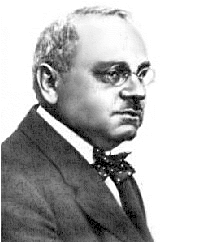Alfred Adler Influenced the World of Psychiatry and Personal Development

Alfred Adler was a psychotherapist who developed the idea of individual psychology and established how important feelings of inferiority are in personality development.
He is considered one of the more important influences on the field of psychiatry and personal development, especially as it relates to problems of inferiority, overcompensation, and the need for social connectedness.
Background of Alfred Adler
Alfred Adler was born on February 7, 1870 in Austria. He died of a heart condition at the age of 67 on May 28, 1937. Adler suffered from rickets early in life, and also developed pneumonia from which he was not expected to recover.
Because of his health problems, he took an interest in medicine and
decided at a young age he wanted to become a doctor. Adler pursued
his dream and became an eye doctor first, then a general
practitioner, and eventually a psychiatrist.
Alfred Adler
worked with Freud for a time, but eventually broke from traditional
concepts of psychiatry and began to teach his own ideas about unique
individual personality development.
Adler also traveled and
lectured extensively. Although the war slowed him down some, he
still became renowned worldwide for his work with children and
troubled adults, and for his new view of the human mind.
The Ideas of Alfred Adler
In addition to addressing fellow psychiatric professionals, Adler also wrote personal development books and articles directed toward the general public, so he could offer help to a wider audience.
Because he was Jewish, his Austrian
clinics were shut down in the 1930s and Adler moved to the United
States and became a professor at the Long Island College of Medicine.
His sudden death by heart attack caused his ideas to languish for a
time, but his ideas have had a lasting impact on the field of
psychiatry to this day.
Some of the concepts Adler focused on include:
• Development
of community
• Mental health prevention
• The creative self
and holism
• Social development and embeddedness
• Feelings of
inferiority and superiority
• Compensation
• Early memories
• Birth order and family influences
• Unconscious realms
•
Life task accomplishments
• Dream interpretation
• Feelings of
guilt
• Neurosis and symptoms of mental disease
The core
of Adler's beliefs was that people are individuals. That became the
basis of his school of individual psychology. However, in addition
to thinking of individuals as an indivisible whole, Adler also
recognized the deep need for connectedness to the surrounding world.
Alfred Adler combined his theories with experience to arrive at a
view of psychiatry that was holistic, metaphysical, and designed to
treat patients as whole beings rather than a set of symptoms.
Alfred Adler Books - Books by Alfred Adler
 |
 |
 |
 |
| If you click the pictures above, you will come to the relevant pages on Amazon.com for the first 4 Volumes of "The Collected Clinical Works of Alfred Adler". Below on this page you will find links to all the volumes. |
Alfred Adler was a prolific writer, and during his lifetime, he had over 300 works published. Many of his writings are contained in "The Collected Clinical Works of Alfred Adler," that was published by the Alfred Adler Institute.
Some of his books are available today and can be read by the general public. These are listed below.
The Legacy of Alfred Adler
Many people consider the work of Adler to be more relevant today than that of pop psychologists. He has had a lasting effect on the field of psychiatry from the way students are trained to the way patients are treated.
He helped people come to a better understanding of the human mind so
reasons behind behaviors could be understood, and change could be
brought about. His advice has helped parents raise healthier
children, and helped spouses build stronger relationships.
Today, his name lives on. There are schools and institutes that bear
his name. The concepts he offered the world are called
Alderian studies or theories. His methods are used to help
patients in clinical settings and are also used by personal
development enthusiasts who enjoy reading his books and modern
derivations of his ideas.
The Personal Development Guy's Self Improvement Ezine (FREE)
Would you like to keep in touch - and get high-level tips and special bonuses? Then please sign up for my self improvement newsletter The Personal Development Guy's Self Improvement Ezine. It is totally FREE.
I LOVE Your Support
If you've found the free personal development content on this website useful, please click the Donate button. Your donation will help me to keep producing free, high-level self improvement information. I am VERY GRATEFUL for your support!
Inspirational Quotes, Poems and Funny Short Stuff
If you want, you can also get your personal development, spirituality and general wisdom in an ultra light version - or even add your own wisdom to the site. Just go to the other sister of this website at:
- World's Best and YOUR Best Quotes, Poems and Short Funny Stuff
Quotescoop.com is also known as:
(http://www.inspirational-quotes-short-funny-stuff.com).
High-Level Positive Parenting Advice and Deep Insights
Positive Parenting Ally is the parenting equivalent of the Personal Development Guy. This is where you go if you want really deepen your understanding of parenting, empower your kids and make everyday life more easy and joyful.
Positive-Parenting-Ally.com
- Parenting advice for the conscious, open-minded parent!
Back to the top of this page about Alfred Adler Influenced the World of Psychiatry and Personal Development
Where Would You Like to Go Next?
To see what has been added to this site recently (plus offers, etc.), check out Blog & News at thePersonalDevelopmentGuy.comTo share your own short self improvement ideas, tips, musings, quotes, stories, spiritual jokes, etc. (and read the short ideas, etc. others have shared) jump to Shared Blog: Self Improvement Ideas
Jump to Self Help Books.
List of articles about self help books listed alphabetically: Alfred Adler, Barbara De Angelis, Maya Angelou Biography, Arjuna Ardagh, Richard Bandler, Brandon Bays, Alain de Botton, Gregg Braden, Brene Brown, Les Brown, Leo Buscaglia, Tony Buzan, Andrew Carnegie Biography, Carlos Castaneda, Pema Chodron, Deepak Chopra, Deepak Chopra Books Paulo Coelho, Stephen Covey, Peter Drucker, T. Harv Eker, Masary Emoto, Timothy Ferriss, Debbie Ford, Viktor Frankl, Mahatma Gandhi, Gangaji, Shakti Gawain, Kahlil Gibran, Daniel Goleman, Amit Goswami, Alex Grey, Stanislav Grof, David Hawkins, Louise Hay, Hermann Hesse, Esther Hicks and Jerry Hicks, Napoleon Hill, Susan Jeffers, C G Jung, Jon Kabat-Zinn, Byron Katie, Robert Kiyosaki, Bruce Lipton, Ramana Maharshi, J W Marriott, Abraham Maslow, John Maxwell, Drunvalo Melchizedek, Anthony de Mello, Anthony De Mello Quotes, Dan Millman, Bruce Moen, Robert Monroe, Michael Newton, Daniel Pink, Dave Ramsey, Ayn Rand Books, James Redfield, Cheryl Richardson, Anthony Robbins, Anthony Robbins Books Carl Rogers, Jim Rohn, Marshall Rosenberg, Geneen Roth, Don Miguel Ruiz, Robin Sharma, Barbara Sher, George Soros Biography, George Soros Quotes, Eckhart Tolle, Brian Tracy Books, Neale Donald Walsch, , Joe Vitale, Lyall Watson, Alan Watts, Stuart Wilde, Marianne Williamson, Larry Winget, Gary Zukav, Best Self Help Books, Self Help Books for Women,
Jump to the Personal Development Guy Homepage










